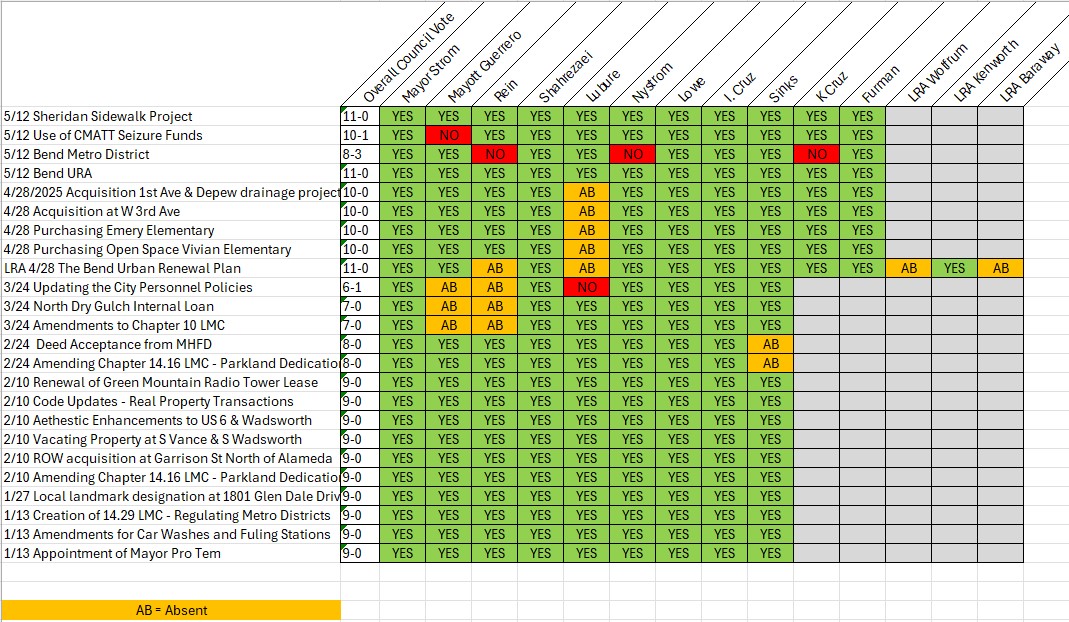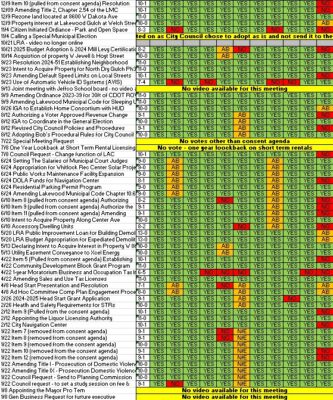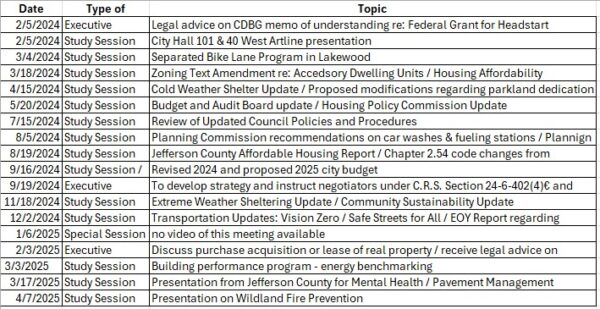By Karen Gordey
You’d be forgiven if you missed it — after all, the City didn’t exactly roll out the red carpet for public input — but Lakewood is in the middle of completely rewriting its zoning code. And on May 21st, the Planning Commission passed 16 amendments in one night. Sixteen. Because who doesn’t want to restructure the entire city with the speed and clarity of a late-night city hall cram session?
Here’s the kicker: Lakewood is a home rule city, meaning we have the power to make our own land use decisions. But instead of using that power to protect neighborhoods or push back on one-size-fits-all state mandates, the City Council passed a resolution last year (Resolution 2024-62) that basically says, “Tell us what you want, Colorado — we’ll make it happen.” Meanwhile, six other cities are suing the state to protect their local control. Lakewood? We’re sending engraved invitations to the bulldozers.
If you’re not paying attention yet, you should be. Because staff expects these changes to take effect in September and if residents don’t start showing up and speaking up, we’ll be stuck with zoning we didn’t ask for, can’t undo, and won’t recognize.
“Home Rule vs Statutory Rule”
Before we go any further, it is important to understand the difference between statutory rule and home rule. So that there is no confusion, I went to the Colorado Municipal League’s website (www.cml.org). The following is their explanation of the two: “Colorado cities and towns operate under provisions of Colorado state statutes (and are referred to as “statutory” cities and towns) unless voters adopt a municipal charter to become a “home rule” city or town.
Home rule is based on the theory that the citizens of a municipality should have the right to decide how their local government is to be organized and how their local problems should be solved. Municipal home rule derives its authority directly from the Colorado Constitution. It affords residents of cities and towns that adopt a local charter freedom from the need for state-enabling legislation and protection from state interference in “both local and municipal matters.” The Lakewood City Charter was established on November 1, 1983. While it has been modified by the voters 5 times (the latest on November 2, 2004, we are still a home rule city.
Lakewood City Charter and Lakewood Together
Page 27 of the City Charter talks about planning and zoning. According to the charter, the city council could have established Ward Advisory Committees to try to corral all these changes but instead are using Lakewood Together for community input. In fact, I attended the Ward 5 meeting on June 14th and Councilman LaBure said that he tried to create committees last year and did not have support for this.
Let’s take a look at the Lakewood Together site. On the front page of the zoning updates section (Lakewood Together Zoning Updates), it clearly references the state law requirements and again we are a home rule city so we are allowed to do what is best for our community. This will be important to remember when I talk about the 16 amendments.
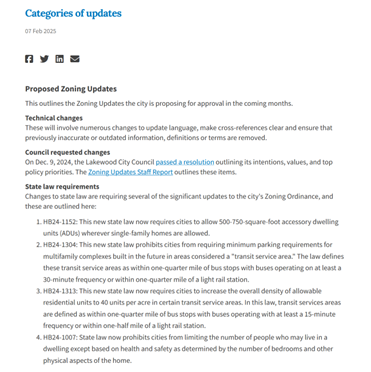
The 2024 City Council Resolution: Pre-Commitment to State Zoning Goals
The City Council passed a resolution Resolution 2024-62 that sounds harmless — values like affordability, walkability, and sustainability — but when you read the details, it’s a blueprint for surrendering home rule. The resolution adopts state-level zoning goals before zoning code revisions or public feedback were complete. That includes:
- Eliminating single-family zoning
- Legalizing zero-lot line housing
- Codifying 90-day approvals for affordable housing
- Committing to Proposition 123 (as modified by HB 23-1304) requirements
- Requiring compliance with parking minimum elimination
Bottom line: Lakewood didn’t just “revise” its zoning goals; it absorbed the state’s playbook wholesale. This was covered briefly by the Lakewood Informer: Jedi Mind Tricks – The New Zoning Code WILL BE Good
Why Didn’t Lakewood Join the Lawsuit with Other Home Rule Cities? Good question!
Recently, six Colorado cities banded together to sue the state over its new zoning mandates — arguing that the laws violate their constitutional rights as home rule municipalities. (6 Front Range cities sue over housing laws, governor’s threat to withhold state funds) Lakewood? We sat that one out.
At the Ward 5 meeting on Saturday, June 14th, I asked our Councilors a simple question: Was our absence because of Resolution 2024-62, which essentially pre-commits Lakewood to implementing state zoning goals? And if the lawsuit is successful, meaning those cities win back their rights to local control, won’t we be stuck with sweeping zoning changes we didn’t have to make?
Councilman LaBure responded:
“We are a home ruled city but we are also a state entity. The state passes things all the time that encroach on local control. The argument has been historically well zoning and parking issues and all those things are matters of local concern and not the state concern. And Judiciary had tended to draw a line there. However, the state has increasingly been making the argument that there is a housing crisis statewide so we need more and more control over local zoning issues because it is actually a matter of state concern. I would have been happy to have jumped on that lawsuit however, other cities already did it and we are part of the Colorado Municipal League (CML). And CML has supported that lawsuit and in that sense we are member and if not the largest so in some sense we are part of that because of our CML affiliation. And it is a fair question to ask about if the lawsuit is successful, then we would be stuck with zoning changes that were not needed.”
Translation: we could have stood up for home rule; but we’ll just let other cities take the heat and hope our dues to the Colorado Municipal League somehow cover us by association.
Councilor Nystrom added that she did ask the City Attorney the same question but didn’t get a clear answer. She also pointed out that HOAs aren’t safe from this zoning overhaul either. While HOA covenants are seen as contracts between homeowners and their associations, local zoning ordinances will override those agreements. So yes, if you live in an HOA and thought you were protected, think again.
The bottom line? There is still no clear reason why Lakewood didn’t join the lawsuit, especially when we had the opportunity and the legal standing. In the words of Councilman LaBure, we’re “essentially deregulating zoning.” Deregulation is one thing. Doing it blindly and permanently, without any legal backstop or flexibility, is another; and it’s not necessarily a good thing for current residents or future housing stability.
The 16 Amendments Passed on May 21st
Let’s talk about transparency or the lack thereof. As of this writing on June 16th, the Lakewood Together website still links to the April 23rd Planning Commission meeting, but not the May 21st meeting where 16 amendments were introduced and passed. You read that right: the most significant zoning overhaul in years, and they can’t be bothered to upload the meeting where it happened. The most recent version of the proposed zoning code amendments? Dated May 19th, which doesn’t even reflect what was voted on.
The May 21st meeting video is available on lakewood.org, which makes it difficult to miss important updates since they aren’t keeping everything together, as originally portrayed. Amendments are still possible but this isn’t up for public discussion on the latest revisions yet.
At the Ward 5 meeting on June 14th, I asked when the public could expect a clean, updated version of the zoning ordinance. Councilor Nystrom responded that Planning Director Travis Parker and his team were “supposed to be” updating it and she will check on that. Spoiler alert: they haven’t. It’s been nearly four weeks, and residents still don’t have access to a finalized copy of the changes that are supposedly going into effect in September.
So what gives? Is the Planning Department deliberately withholding information from the public or are we just witnessing yet another performance of Lakewood’s Greatest Hits: Bureaucratic Incompetence, Volume 23?
Below is a chart of the 16 amendments passed. The most recent redline version of the zoning code? A casual 409 pages. And yes, buried in that bureaucratic brick are more than a few red flags.
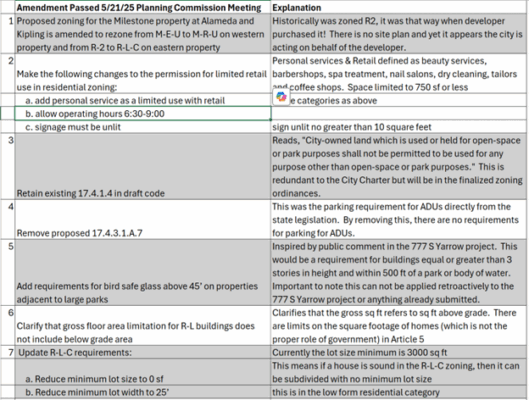
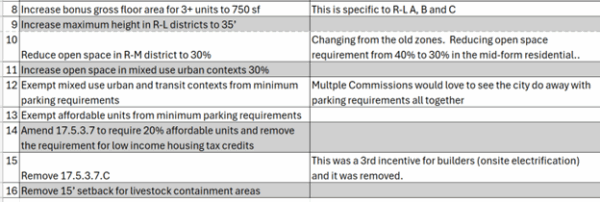
Let’s start with the Authority section (17.1.5). It originally cited “the city home rule charter” — a key phrase affirming Lakewood’s autonomy. That language? Now redlined. Gone. Instead, we’re left wondering whether the City is scrubbing references to home rule on purpose… or just by accident (which, frankly, would be just as troubling).
Then there’s section 17.1.7 – General Provisions, which now reads:
“Except as hereinafter provided, no building, structure, property, or land shall be used or occupied and no building or structure, or part thereof, shall be erected, constructed, reconstructed, altered, repaired, moved, or structurally altered except in conformance with this Zoning Code.”
Sounds straightforward, right? Except it’s not. Take Article 5, for example it limits the square footage of homes above grade. Basements are exempt (for now), but let’s say your 4,000 sq. ft. above-grade home burns down. Under the new code? You may not be able to rebuild it to the same size above ground. Goodbye, replacement value.
And then, scattered throughout this 409-page monster, are things like:
- Building re-use allowances, perfect if you’re excited to see old office parks or shuttered schools converted into multi-unit housing or whatever else they deem appropriate. (Spoiler: I’m writing about Emory Elementary next.)
- Subdivision of residential land, your neighbor could sell, split the lot, and slap up a quadplex or a village of tiny homes right next to you.
- Zero parking requirements and lot line-to-lot line construction, great for density, not so great for your driveway, your view, or your sanity.
- Up to 750 sq ft of commercial space allowed in any home, in any neighborhood — for so-called “personal services,” with no parking required. Think hair salons, spa treatments, dry cleaners and even coffee shops… in what used to be a quiet cul-de-sac.
- Horse property? That charming acreage you paid a premium for? It could be surrounded, subdivided, or rezoned into oblivion.
- Commercial creep into residential zones, yes, more blending of use types with less notice and less input from the people actually living there.
In short: this isn’t a “minor update.” This is a wholesale rewrite of how Lakewood builds, lives, and grows and it’s happening fast, without your input.
Final Call to Action: Speak Now or Get Steamrolled
This zoning overhaul is tentatively scheduled for first reading on July 28th, with the second reading and public comment set for Monday, August 11th. Mark your calendars, but don’t wait until then.
The time to speak up is NOW. Choose any upcoming City Council meeting and use the General Public Comment period to voice your concerns. Demand a town hall. Ask for transparency. Hold them accountable.
Then on Monday, August 11th, we need to pack the room and show up in force. Sign up to speak on the zoning ordinance agenda item and make it clear that these changes are not welcome without real public involvement.
Let’s be honest, this City Council has a long history of ignoring the will of its constituents, and we should be prepared for them to pass this anyway. If that happens, the work doesn’t stop, it begins. We’ll have 30 days to gather petition signatures to either force Council to reverse their vote or take the issue to the ballot as a referendum.
We’re actively looking for team leaders to help organize signature collection across the city. If you’re interested in helping coordinate efforts in your ward or neighborhood, email me at KarenBGordey@gmail.com and include your name, contact information and ward.
This isn’t a drill. It’s your driveway, your street, and your city. Pick a meeting. Grab the mic. Let’s save our Lakewood!
Upcoming City Council Meetings (note: there are no additional meetings in June)
July 14th, 7 pm
July 28th, 7pm
Link to City Council contact information: https://www.lakewood.org/Government/City-Council/City-Council-Members
Link to determine what Ward you live in: https://www.lakewood.org/My-Neighborhood
Note: the conversation on zoning is still ongoing. There will be more changes coming


